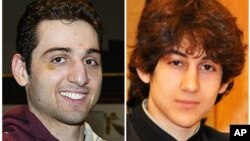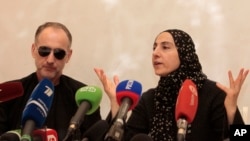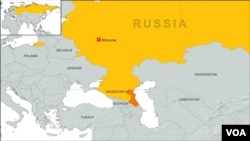WASHINGTON —
Two leading experts on the Russian republic of Dagestan suspect Moscow knows a lot more about one of the accused Boston Marathon bombers than it is telling U.S. investigators. Another warns unrest in the Caucasus region, which includes Dagestan, could spill over into February’s winter Olympics in Sochi, less than a day’s drive away on the Black Sea.
Two ethnic Chechen residents of the Boston area–Tamerlan and Dzhokhar Tsarnaev–were accused of last week’s marathon bombing. Tamerlan, 26, was killed in a shootout with Boston police last Friday and Dzhokhar, 19, was captured later the same day.
Tamerlan spent half of 2012 in Dagestan, ostensibly to visit relatives. U.S. investigators are trying to determine if the lengthy visit included contacts with Islamist factions and extremists groups that have been a source of turmoil in the region for years.
In Boston, Tamerlan had expressed sympathies with the ideologies of such groups.
‘Black spot’ in the story
“Tamerlan’s trip to Dagestan remains one of the major ‘black spots’ in the story of the Boston bombers,” said Jean-Francois Ratelle, a professor at George Washington University in Washington. Ratelle worked in Dagestan researching the radicalization of Islamic youths in the Caucasus region.
Ratelle said Russia’s FSB intelligence agency closely monitors Islamist groups in Dagestan.
“I grew a beard and was spending time among young, the young radicals," he said. "That was enough for being under constant surveillance, for being detained several times and questioned."
Prior to Tamerlan’s Dagestan trip, Russian intelligence contacted both the FBI and CIA inquiring about Tsarnaev, warning that he might try “to join unspecified underground groups” if he visited the Caucasus region. But, according to the FBI and CIA, Moscow did not supply additional information despite repeated requests.
Ratelle said it was “very interesting” that Russian intelligence did not follow up with a report on Tamerlan’s Dagestan visit despite its earlier warning.
Russians provide no details
Another Dagestan expert troubled by Moscow’s silence is Walter Richmond, professor of Russian studies at Occidental College in California.
“Did Tamerlan Tsarnaev travel to Russia to get to the terrorist training camps?” Richmond said. “We don’t have an answer since the Russian government agency did not provide us with details of his six month stay in Dagestan. [It's] very strange, the fact that a young man who was on the watch list of the Russian security services as a suspect in terrorist activities was allowed to enter the country’s most troubled region, stay and leave with no reported encounter with any of the government agencies.”
Ratelle said he would not be at all surprised if Tamerlan came away from last year’s visit to Dagestan as a much more “radicalized” Islamist.
“I have witnessed many of my young acquaintances in Makhachkala [the regional capital] becoming radicalized during my stay in Dagestan,” he said. “If a young man like Tamerlan Tsarnaev wishes to become a ‘pure Muslim,’ Dagestan is the right access point to get closer to that ideology.”
And Glen E. Howard, president of the Jamestown Foundation, a conservative Washington-based think tank, believes the turmoil in the Caucasus region could spell trouble for the winter Olympics, scheduled in Sochi, just across the Caucasus Mountains from Dagestan.
“The big question we in the West, and especially in the U.S., should be asking ourselves today is about the risks of dispatching thousands of our athletes and spectators to the Olympics in Sochi,” Howard said.
Two ethnic Chechen residents of the Boston area–Tamerlan and Dzhokhar Tsarnaev–were accused of last week’s marathon bombing. Tamerlan, 26, was killed in a shootout with Boston police last Friday and Dzhokhar, 19, was captured later the same day.
Tamerlan spent half of 2012 in Dagestan, ostensibly to visit relatives. U.S. investigators are trying to determine if the lengthy visit included contacts with Islamist factions and extremists groups that have been a source of turmoil in the region for years.
In Boston, Tamerlan had expressed sympathies with the ideologies of such groups.
‘Black spot’ in the story
“Tamerlan’s trip to Dagestan remains one of the major ‘black spots’ in the story of the Boston bombers,” said Jean-Francois Ratelle, a professor at George Washington University in Washington. Ratelle worked in Dagestan researching the radicalization of Islamic youths in the Caucasus region.
Ratelle said Russia’s FSB intelligence agency closely monitors Islamist groups in Dagestan.
“I grew a beard and was spending time among young, the young radicals," he said. "That was enough for being under constant surveillance, for being detained several times and questioned."
Prior to Tamerlan’s Dagestan trip, Russian intelligence contacted both the FBI and CIA inquiring about Tsarnaev, warning that he might try “to join unspecified underground groups” if he visited the Caucasus region. But, according to the FBI and CIA, Moscow did not supply additional information despite repeated requests.
Ratelle said it was “very interesting” that Russian intelligence did not follow up with a report on Tamerlan’s Dagestan visit despite its earlier warning.
Russians provide no details
Another Dagestan expert troubled by Moscow’s silence is Walter Richmond, professor of Russian studies at Occidental College in California.
“Did Tamerlan Tsarnaev travel to Russia to get to the terrorist training camps?” Richmond said. “We don’t have an answer since the Russian government agency did not provide us with details of his six month stay in Dagestan. [It's] very strange, the fact that a young man who was on the watch list of the Russian security services as a suspect in terrorist activities was allowed to enter the country’s most troubled region, stay and leave with no reported encounter with any of the government agencies.”
Ratelle said he would not be at all surprised if Tamerlan came away from last year’s visit to Dagestan as a much more “radicalized” Islamist.
“I have witnessed many of my young acquaintances in Makhachkala [the regional capital] becoming radicalized during my stay in Dagestan,” he said. “If a young man like Tamerlan Tsarnaev wishes to become a ‘pure Muslim,’ Dagestan is the right access point to get closer to that ideology.”
And Glen E. Howard, president of the Jamestown Foundation, a conservative Washington-based think tank, believes the turmoil in the Caucasus region could spell trouble for the winter Olympics, scheduled in Sochi, just across the Caucasus Mountains from Dagestan.
“The big question we in the West, and especially in the U.S., should be asking ourselves today is about the risks of dispatching thousands of our athletes and spectators to the Olympics in Sochi,” Howard said.






